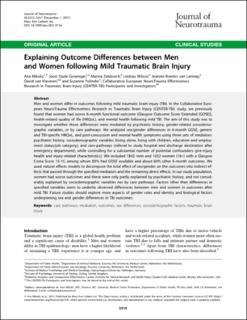Explaining Outcome Differences between Men and Women following Mild Traumatic Brain Injury
Mikolic, Ana; Groeniger, Joost Oude; Zeldovich, Marina; Wilson, Lindsay; van Lennep, Jeanine Roeters; van Klaveren, David; Polinder, Suzanne; Andelic, Nada; Andreassen, Lasse; Anke, Audny Gabriele Wagner; Frisvold, Shirin; Helseth, Eirik; Røe, Cecilie; Røise, Olav; Skandsen, Toril; Vik, Anne; Åkerlund, Cecilia; Amrein, Krisztina; Antoni, Anna; Audibert, Gerard; Azouvi, Philippe; Azzolini, Maria luisa; Bartels, Ronald; Barzo, Pal; Beauvais, Romuald; Beer, Ronny; Bellander, Bo-michael; Belli, Antonio; Benali, Habib; Berardino, Maurizio; Beretta, Luigi; Blaabjerg, Morten; Bragge, Peter; Brazinova, Alexandra; Brinck, Vibeke; Brooker, Joanne; Brorsson, Camilla; Buki, Andras; Bullinger, Monika; Cabeleira, Manuel; Caccioppola, Alessio; Calappi, Emiliana; Calvi, Maria rosa; Cameron, Peter; Lozano, Guillermo carbayo; Carbonara, Marco; Chevallard, Giorgio; Chieregato, Arturo; Citerio, Giuseppe; Cnossen, Maryse; Coburn, Mark
Peer reviewed, Journal article
Published version

Åpne
Permanent lenke
https://hdl.handle.net/11250/2981646Utgivelsesdato
2021Metadata
Vis full innførselSamlinger
Sammendrag
Men and women differ in outcomes following mild traumatic brain injury (TBI). In the Collaborative European NeuroTrauma Effectiveness Research in Traumatic Brain Injury (CENTER-TBI) study, we previously found that women had worse 6-month functional outcome (Glasgow Outcome Score Extended [GOSE]), health-related quality of life (HRQoL), and mental health following mild TBI. The aim of this study was to investigate whether those differences were mediated by psychiatric history, gender-related sociodemographic variables, or by care pathways. We analyzed sex/gender differences in 6-month GOSE, generic and TBI-specific HRQoL, and post-concussion and mental health symptoms using three sets of mediators: psychiatric history, sociodemographic variables (living alone, living with children, education and employment status/job category), and care-pathways (referral to study hospital and discharge destination after emergency department); while controlling for a substantial number of potential confounders (pre-injury health and injury-related characteristics). We included 1842 men and 1022 women (16+) with a Glasgow Coma Score 13-15, among whom 83% had GOSE available and about 60% other 6-month outcomes. We used natural effects models to decompose the total effect of sex/gender on the outcomes into indirect effects that passed through the specified mediators and the remaining direct effects. In our study population, women had worse outcomes and these were only partly explained by psychiatric history, and not considerably explained by sociodemographic variables nor by care pathways. Factors other than differences in specified variables seem to underlie observed differences between men and women in outcomes after mild TBI. Future studies should explore more aspects of gender roles and identity and biological factors underpinning sex and gender differences in TBI outcomes.
